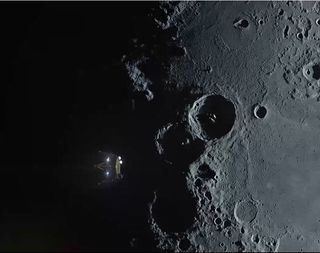Israeli Beresheet Spacecraft to Attempt Historic Moon Landing Today! Watch Live
Editor's note: Israel's Beresheet moon lander has failed in its attempt to land on the moon. An initial story will be posted shortly.
Original story: To date, three countries have landed on the moon. Today, that number may become four.
Israel launched its first lunar mission, a spacecraft called Beresheet, on Feb. 21, riding piggyback on a SpaceX Falcon 9 rocket. It spent six weeks orbiting Earth in leisurely, ever-widening circles before slipping into orbit around the moon on April 4. It remained there for a week, preparing for the defining moment of the mission: attempting to touch down softly on the moon's surface.
That moment comes today (April 11), around 3 or 4 p.m. EDT (1700 or 1800 GMT) — the exact time has yet to be announced. The Beresheet mission partners — nonprofit organization SpaceIL and government-owned aerospace company Israel Aerospace Industries — will livestream events surrounding the landing from mission control. You can watch the broadcast on Space.com or on SpaceIL's Facebook page.
SpaceIL's webcast will begin at 2:45 p.m. EDT (1845 GMT). It will be 9:45 p.m. local time at SpaceIL's control center in Yehud, Israel.
Related: Pioneering Israeli Moon Lander Arrives in Lunar Orbit

If everything goes smoothly, Israel will join the U.S., the former Soviet Union and China in having softly landed on the lunar surface. The spacecraft is targeting a landing site within Mare Serenitatis (the Sea of Serenity), a vast lava plain on the near side of the moon. Once Beresheet has touched down, it will remain active for a couple of Earth days before the mission ends in the heat of the long lunar day.
Get the Space.com Newsletter
Breaking space news, the latest updates on rocket launches, skywatching events and more!
The short lifetime reflects the fact that Beresheet's true goal is simply to land safely and make a case for Israel's engineering capabilities, rather than to tackle any science questions. On the science side, the lander is carrying a retroreflector device provided by NASA, which scientists will be able to use to pinpoint the distance between that apparatus and Earth; and a device to measure the magnetic field of the moon. Beresheet also carries an Israeli flag, a large package of information from English Wikipedia, copies of the Bible and drawings created by Israeli children.
The Beresheet mission is an offshoot of the Google Lunar X Prize competition, which began in 2007 and challenged teams to rove on the moon's surface. A team that successfully met the competition's goals would have received $20 million, but the prize expired unclaimed last year. The competition has already announced that if Beresheet's landing goes as planned, the team will win a $1 million Moonshot Award, although even with perfect performance, the lander will not meet the original X Prize's milestones.
The Beresheet landing marks another installment of an international rush to the moon this year, which China kicked off on Jan. 2 by landing its Chang'e 4 lander and rover on the far side, a feat no country had accomplished before. India hopes to touch down on the moon's surface this year for the first time with its Chandrayaan-2 mission, and NASA has said it is hoping to begin its ambitious program of returning humans to the moon by 2024 by sending small commercial landers carrying science instruments to the moon before the end of this year.
- Israel's 1st Moon Lander: The SpaceIL Beresheet Lunar Mission in Pictures
- Why It'll Take Israel's Lunar Lander 8 Weeks to Get to the Moon
- Israeli Moon Lander Snaps Epic Space Selfie with a Full Earth
Email Meghan Bartels at mbartels@space.com or follow her @meghanbartels. Follow us on Twitter @Spacedotcom and on Facebook.
Join our Space Forums to keep talking space on the latest missions, night sky and more! And if you have a news tip, correction or comment, let us know at: community@space.com.

Meghan is a senior writer at Space.com and has more than five years' experience as a science journalist based in New York City. She joined Space.com in July 2018, with previous writing published in outlets including Newsweek and Audubon. Meghan earned an MA in science journalism from New York University and a BA in classics from Georgetown University, and in her free time she enjoys reading and visiting museums. Follow her on Twitter at @meghanbartels.
